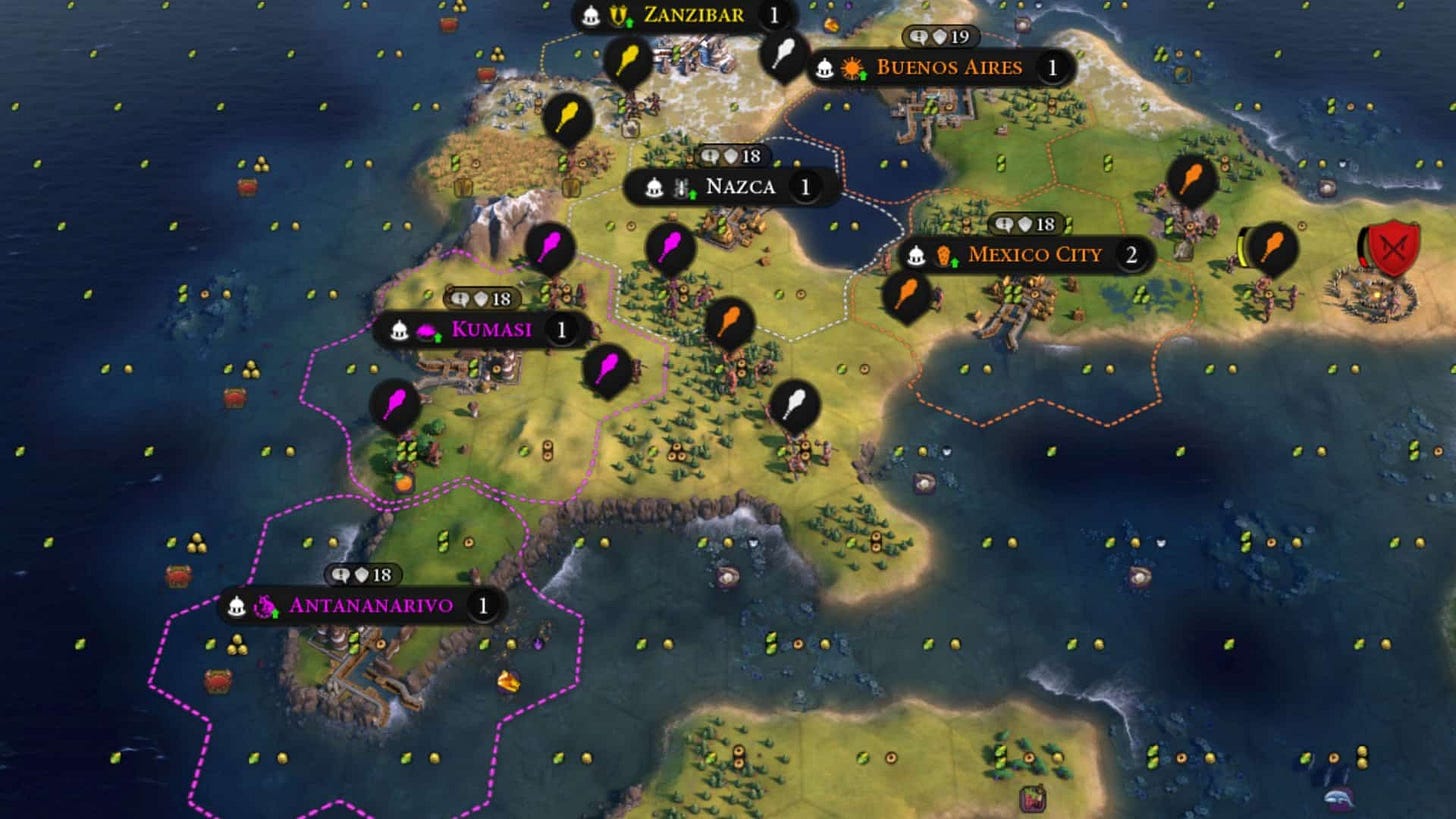On Towards the Stars: City States
[This post is part of a larger strategy guide for Civilization 6]
There are so many things to say about city states. A lot of city states are game winning in specific situations, and all of them are worth pursuing at some level.
Basic Tactics
Every city state gives bonuses depending on the city state type and the number of envoys you send there. One envoy leads to one resource in the capital, three leads to additional resources for tier 1 buildings (e.g. libraries and amphitheaters, workshops), and six leads to additional resources for tier 2 buildings (e.g. universities, art museums, factories). So right off the bat, if you have spare envoys you should be sending them around to get these bonuses.
—
Getting early game bonuses to your capital can be really critical, because an extra yield of any kind can be a huge percentage increase on your total. This means you want to find city states early, complete early city state quests, and try to be the first person to meet a city state to get the free envoy. Of course, there's a bit of RNG here. If you're lucky, you'll have city states right next door. But you can't rely on that, so build scouts and explore. In the early game, it is especially important to try and find (read: luck into) religious city states. The extra faith generation can be the difference between getting that perfect pantheon and not.
You can make your exploration more efficient in the early game by using the settler screen. City states act like other cities in that you cannot yourself settle within 3 tiles of a settlement. That means that when you're using the settler screen, you can see the three tile radius around a city state marked in red. Often, you can see the red tile radius way before you see the actual city state. (We discussed this tactic in the first ten turns section)
—
If you find yourself the suzerain of a bunch of city states, you almost always want to go for Kilwa Kisiwani. Kilwa is a game breaking wonder. If anyone else builds Kilwa, you want to make sure that they either cannot be suzerain of any city state, OR that all the city states are killed/removed from the game.
—
City states participate in wars, but really inconsistently. Some city states will send tons of units to attack your enemies, others will just sit around. There's basically no rhyme or reason for when one happens over the other; don't make city states part of your offensive strategy, but consider getting rid of enemy city states near your borders. If you do have a city state declare war on you, actually build a few units in case it decides to send an army your way (embarrassed to say I've lost a city or two this way…).
Levying city state troops can be a bit tricky. First, it's really expensive. Second, it's again fairly dependent on how many units various city states have built. Third, if you do levy a city state army, your opponents can get rid of that army by flipping the suzerain. That said, levying can be a devastating way to quickly bring up an army and go after an opponent, especially if you're levying a city state that is on the opposite side of your opponent's empire. And levied armies can be upgraded. Personally, I basically never levy unless I have a three-envoy lead on the Suzerain, and even then I rarely have the money for it. The one exception is if I am playing Hungary, in which case I levy units constantly.
Suzerain bonuses
A quick ranking of the top few Suzerain bonuses and why you should get them:
Akkad has the strongest suzerain bonus in the game, by far. The ability for melee to do full damage to walls effectively means you don't need siege engines AND removes a critical mechanism for opponents to regain city health while defending against an invasion. It makes your war machine much stronger and faster, while crippling an enemy's ability to respond. This ability is so game breaking that if you are not Suzerain, you should do everything in your power to kill this city state.
Valetta is a great city state if you have any faith generation at all. The main reason? Instant walls. Valetta lets you avoid having to invest in defense because, if you are ever under attack, you can bring up walls within the same turn the attack was declared. If I'm suzerain of Valetta, I'll basically always keep a bank of enough faith to bring up walls just in case I need it. The rest of the bonuses are a nice cherry on top.
Mohenjo-Daro is a bit goofy, but can be pretty game changing if you build your expansion strategy around keeping Mohenjo-Daro as a Suzerain. Hopefully obvious why: Mohenjo-Daro can make generally uninhabitable land as strong as any river valley. In a game that is so centered on playing wide, being able to settle more cities per square tile is a pretty big leg up over your opponents.
Preslav is powerful for much the same reason Mohenjo-Daro is — its suzerain bonus allows you to settle in more places than you could otherwise. But unlike Mohenjo-Daro, where you're primarily targeting land that no one else can go, with Preslav you'll be making pretty aggressive inroads into someone else's territory. If you have Preslav, you can set up some very aggressive land grabs that in turn can help you stage forward attacks. Just be wary of losing the suzerainty (resulting in you suddenly having to deal with loyalty problems) or pissing off your neighbors due to the opportunistic settlements. (Being Suzerain of Preslav also means you can worry a lot less about dark ages, but that’s a much smaller effect than the aggressive settle thing)








